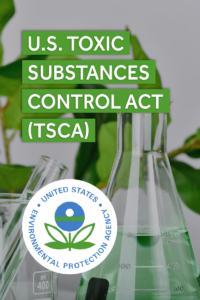Toxic Substances Control Act (TSCA)
November 12, 2024 | Written by GreenSoft Technology, Inc.
EPA Publishes Final Rule Amending PBT Chemical Restrictions Under TSCA
 Phase-in prohibitions and exclusions for certain uses of PIP (3:1) and DecaBDE published
Phase-in prohibitions and exclusions for certain uses of PIP (3:1) and DecaBDE published
On October 31, 2024, the U.S. Environmental Protection Agency (EPA) released a pre-publication notice of revisions to existing rules for Persistent, Bioaccumulative, and Toxic (PBT) chemicals regulated under the U.S. Toxic Substances Control Act (TSCA).
This new “final rule” addresses implementation issues affecting the supply chains of various industry sectors, including nuclear energy, transportation, construction, agriculture, forestry, mining, life sciences, and semiconductor production, by revising compliance dates for certain uses of PIP (3:1) and DecaBDE.
The final rule amends phase-in prohibitions and exclusions on processing and distribution for certain uses and further extends the compliance dates for some articles used in consumer electronic equipment, commercial electronic equipment, heating, ventilation, air-conditioning, refrigeration, and water-heating equipment, power generating equipment, laboratory equipment, and manufacturing equipment, including manufacturing equipment used in the semiconductor industry.
However, the EPA is not revising the October 31, 2024 compliance date for articles not otherwise covered by (1) an exclusion from prohibition or (2) an existing or newly finalized extension to a phase-out compliance deadline.
The amended phase-in prohibitions and exclusions are effective 60 days after the final rule is published in the Federal Register. EPA intends to focus its enforcement on ensuring compliance with the requirements of this final rule.
The proposed changes to the rules only apply to PIP (3:1) and DecaBDE prohibitions, and do not impact the other three PBT substances restricted under 40 CFR Part 751 Subpart E. All existing prohibitions on 2,4,6-Tris(tert-butyl)phenol (2,4,6-TTBP), Hexachlorobutadiene (HCBD), and Pentachlorothiophenol (PCTP) will remain unchanged and in force.
Where to Find the Regulation Text
The EPA‘s announcement of the proposed changes can be found here. The full text of the pre-publication of the regulation can be found here. GreenSoft Technology has created a red-lined version of the amended regulation text so that readers can see the changes between the old and new versions. Download our red-lined version of the regulation here.
Notable changes affecting electronic equipment
Some notable changes affecting the electronics industry are included in the newly amended rule. Changes affecting electronic equipment include, but are not limited to:
- PIP 3:1 and DecaBDE prohibitions and restrictions no longer apply to products or articles containing the substance at concentrations less than 0.1 percent by weight, if the PIP (3:1) or DecaBDE was not intentionally added to the product or article.
- While the use and processing of PIP 3:1 is prohibited as of October 31, 2024, operators can continue to distribute PIP 3:1 containing articles in commerce until October 31, 2026.
- A permanent exclusion has been provided for the use of PIP (3:1) in containing products for use in circuit boards and wire harnesses, including but not limited to terminal and fuse covers, cable sleeves, casings, connectors and tapes, and PIP (3:1)-containing circuit boards and wire harnesses including but not limited to terminal and fuse covers, cable sleeves, casings, connectors and tapes.
- As such, many electronic components will no longer be in scope for TSCA PIP 3:1 prohibition. However, this applies to PCB and cable assemblies only. Enclosures, pumps, motors, fasteners, and other items which are not specifically intended to be used on a circuit board remain in scope.
- For PIP (3:1) applications in replacement parts for consumer electronic equipment, there will be a 7-year period until the prohibition takes place.
- The exclusion of the use of PIP (3:1) in lubricants and grease from the regulation has been narrowed. PIP (3:1) will now only be excluded from restrictions when used in lubricants and grease used for aerospace and turbines. For all other applications of PIP (3:1) in lubricants and grease, there will be a 15 year period until the prohibition takes place.
- The exclusion of the use of PIP (3:1) in motor vehicle (including motorized heavy machinery) parts has been removed and replaced with non-permanent exemptions. The exemptions expire in 15 years for new vehicles and parts for new vehicles (including heavy machinery) and expire in 30 years for replacement parts for vehicles and heavy machinery.
- The exclusion of the use of PIP (3:1) in aerospace manufacturing has been removed and replaced with a 30-year exemption. Although the exemption has a 30-year applicability period, manufacturers supplying products and components to the aerospace industry may begin to see concern over the restriction sooner due to the long lifespans of aerospace products.
- The use of PIP (3:1) in parts for new manufacturing equipment, including in the semiconductor industry, new heating, ventilation, air-conditioning, refrigeration, and water-heating equipment, new power generating equipment, new laboratory equipment, as well as new commercial electronic equipment is allowed under a new phase-in exemption. The exemption expires in 10 years for new parts. Replacement parts are allowed until the end of the manufacturing and laboratory equipment service lives, or for 25 years, based on equipment type.
GreenSoft Technology helps with TSCA supply chain data collection
GreenSoft Technology can help companies affected by the TSCA regulation by collecting substance data on all parts within their products to ensure that none of the restricted PBT substances are present.
As part of our TSCA data services, we will contact your supply chain to collect data on the presence of PIP 3:1, decaBDA, and/or all five PBT substances in your products. We will guide your suppliers to help them collect the necessary information that you need if they do not already have the information available.
We contact your suppliers as many times as it takes to obtain complete and accurate data, and provide you with compliance reports and substance analysis for your products, which you can use to ensure your products are in compliance with TSCA.
Contact us to learn more.





